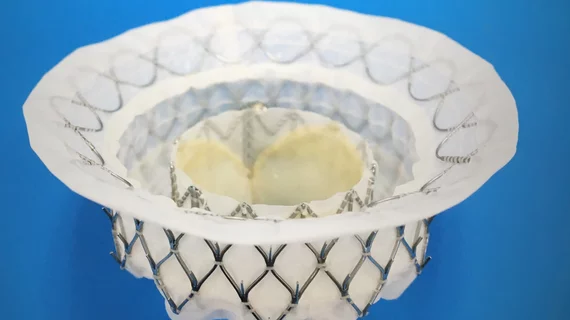Intrepid transcatheter mitral valve pilot study shows positive 3-year outcomes
New data on the Medtronic Intrepid transcatheter mitral valve replacement (TMVR) system, including late-breaking results from the Intrepid Pilot Study and Intermediate-Term Outcomes of the Intrepid Early Feasibility Study (EFS), were presented at the 2022 Transcatheter Cardiovascular Therapeutics (TCT) conference. The data shows further positive evidence for the TMVR system, including clinical insights supporting transapical and transfemoral approaches.
The Intrepid TMVR system to treat mitral regurgitation (MR) integrates self-expanding, dual-stent technology with a tissue valve that is delivered through a catheter and placed directly into the native mitral valve. This restores normal blood flow through the heart without the need for open-heart surgery. The outer stent frame is designed to attach and conform to the native valve without the need for additional sutures, tethers or anchors to secure the prosthesis. The inner stent houses the valve, which is made from bovine tissue.
“The data presented at TCT adds to the growing body of evidence demonstrating the Intrepid TMVR System is a promising long-term solution for patients with severe, symptomatic MR, who are at high risk for conventional mitral valve surgery,” said Renuka Jain, MD, cardiologist with Aurora St. Luke’s Medical Center and investigator in the Intrepid Pilot Study in a statement on the results.
Intrepid Pilot Study mid-term outcomes was a TCT late-breaking clinical trial
Presented as late-breaking clinical science, results from the Intrepid Pilot Study provide the longest follow-up from the largest series of inoperable patients with severe, symptomatic MR treated with a transapical TMVR system. The study assessed the safety and performance of the Intrepid TMVR using a transapical delivery.
Results from the prospective, multi-center, non-randomized Intrepid Pilot study demonstrated positive outcomes of the transapical MV replacement with the Intrepid TMVR system. At three-years, echocardiographic outcomes showed stable valve function with low mean mitral valve gradients, persistent MR reduction with less than 98% of patients with paravalvular leak and significant reduction in left ventricular end diastolic volume.
Intrepid Early Feasibility Study intermediate-term outcomes
Medtronic also announced intermediate-term outcomes of the Intrepid EFS, the first study of a minimally-invasive transfemoral bioprosthetic TMVR system to treat MR. Findings of the prospective, multicenter, non-randomized EFS were presented as part of the Mitral Innovation Session at TCT.
The analysis included 30-day outcomes from the Intrepid EFS and the first one-year results for 14 patients, showing successful device implantation and valve performance. Results include:
• High rates of successful device implantation (96.7%).
• Device safety with acceptable rates of periprocedural complications (27%) and no mortality or stroke (0%).
• Excellent valve performance including near complete elimination of MR in all patients (91%).
• Improved symptoms and QoL.
“We are encouraged by these early results for the Intrepid TMVR system using the novel transfemoral and look forward to evaluating and furthering evidence around the clinical outcomes and hemodynamics of the device,” explained Firas Zahr, MD, interventional cardiologist and co-director of the Complex Heart Valve Program at Oregon Health and Science University. “These results can help to establish TMVR as a safe treatment option for patients that are high-risk for conventional surgical approaches.”
The Intrepid TMVR system is available for investigational use only and it is not approved anywhere for use outside of clinical studies. Medtronic is currently enrolling participants in its landmark APOLLO Trial, which will evaluate the safety and efficacy of the Intrepid system in correcting MR.

